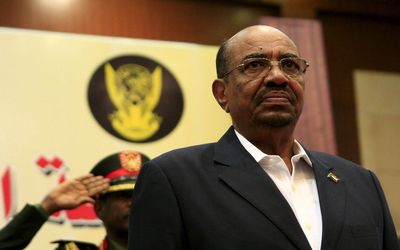SA WAS the first African nation to sign the Rome Statute, the international agreement between states to prosecute and sentence those responsible for war crimes, genocide and crimes against humanity.
The democratic SA had always prided itself on being a good global citizen, up there with the best when it came to safeguarding human rights and enforcing the laws designed to do that.
The Supreme Court of Appeal’s ruling on the Omar al-Bashir case will, we trust, provide the basis for SA to regain that gloss, which was badly chipped when government officials sneaked the Sudanese president through Waterkloof air base and out of SA last year in defiance of SA’s own legislation.
That SA broke its own laws is what the Supreme Court of Appeal has now confirmed, dismissing the appeal by the government, which had argued that it was not required to arrest Mr Bashir for alleged war crimes, genocide and crimes against humanity related to the Darfur conflict, even though the International Criminal Court had indicted him for these crimes.
The government declined to arrest him when he arrived in SA last year for an African Union summit, and he was whisked out of the country while the High Court was deliberating on the matter. The government didn’t query the ICC’s warrants, arguing rather that the hosting agreement it had with the African Union for the summit, and the ministerial proclamation effecting that, protected Mr Bashir from arrest while he was here.
The High Court threw that argument out.
The government then appealed against the judgment, this time changing its tune and arguing that Mr Bashir was immune from arrest because as a head of state, he enjoyed immunity from arrest or prosecution in terms of customary international law. The Supreme Court of Appeal turfed that out, saying domestic legislation obliged SA to arrest Mr Bashir.
Its reasoning was, in essence, that not only had SA signed up as a party to the Rome Statute, whose precepts the ICC is there to enforce, but SA had given effect to the court’s jurisdiction with its own implementation legislation. That’s the crunch: we’re not just bound by some international court, but have bound ourselves with our own laws to assist the ICC in arresting and prosecuting alleged war criminals such as Mr Bashir. That Implementation Act overrides any immunity Mr Bashir might have had.
Said the Supreme Court of Appeal: "The conduct … in failing to take steps to arrest and detain, for surrender to the International Criminal Court, the president of Sudan after his arrival in SA … was inconsistent with SA’s obligations in terms of the Rome Statue and section 10 of the Implementation of the Rome Statute of the International Criminal Court Act … and unlawful."
Importantly, too, the court rejected the argument that it wasn’t worth making a ruling because Mr Bashir is no longer in SA and nothing can be done to implement its ruling.
What is crucial is that the court’s ruling makes clear that those charged with crimes such as genocide are not welcome in SA, and should be arrested if they dare visit.
Even more crucial, and immediate, is that the ruling raises the question of which officials, or government ministers, were responsible for breaking the law and what sanctions they will face.
There is no question that legal action against them should be pursued and we trust the government will make sure that happens.
Of course, there is debate about whether SA should remain party to the ICC. But this is no time to dent our already badly damaged credibility by pushing that notion. And our tradition of good global citizenship should surely be a matter of pride.
The Bashir judgment will hopefully help to underpin that.

Sudanese President Omar al-Bashir. Picture: REUTERS/MOHAMED NURELDIN ABDALLAH
SA WAS the first African nation to sign the Rome Statute, the international agreement between states to prosecute and sentence those responsible for war crimes, genocide and crimes against humanity.
The democratic SA had always prided itself on being a good global citizen, up there with the best when it came to safeguarding human rights and enforcing the laws designed to do that.
The Supreme Court of Appeal’s ruling on the Omar al-Bashir case will, we trust, provide the basis for SA to regain that gloss, which was badly chipped when government officials sneaked the Sudanese president through Waterkloof air base and out of SA last year in defiance of SA’s own legislation.
That SA broke its own laws is what the Supreme Court of Appeal has now confirmed, dismissing the appeal by the government, which had argued that it was not required to arrest Mr Bashir for alleged war crimes, genocide and crimes against humanity related to the Darfur conflict, even though the International Criminal Court had indicted him for these crimes.
The government declined to arrest him when he arrived in SA last year for an African Union summit, and he was whisked out of the country while the High Court was deliberating on the matter. The government didn’t query the ICC’s warrants, arguing rather that the hosting agreement it had with the African Union for the summit, and the ministerial proclamation effecting that, protected Mr Bashir from arrest while he was here.
The High Court threw that argument out.
The government then appealed against the judgment, this time changing its tune and arguing that Mr Bashir was immune from arrest because as a head of state, he enjoyed immunity from arrest or prosecution in terms of customary international law. The Supreme Court of Appeal turfed that out, saying domestic legislation obliged SA to arrest Mr Bashir.
Its reasoning was, in essence, that not only had SA signed up as a party to the Rome Statute, whose precepts the ICC is there to enforce, but SA had given effect to the court’s jurisdiction with its own implementation legislation. That’s the crunch: we’re not just bound by some international court, but have bound ourselves with our own laws to assist the ICC in arresting and prosecuting alleged war criminals such as Mr Bashir. That Implementation Act overrides any immunity Mr Bashir might have had.
Said the Supreme Court of Appeal: "The conduct … in failing to take steps to arrest and detain, for surrender to the International Criminal Court, the president of Sudan after his arrival in SA … was inconsistent with SA’s obligations in terms of the Rome Statue and section 10 of the Implementation of the Rome Statute of the International Criminal Court Act … and unlawful."
Importantly, too, the court rejected the argument that it wasn’t worth making a ruling because Mr Bashir is no longer in SA and nothing can be done to implement its ruling.
What is crucial is that the court’s ruling makes clear that those charged with crimes such as genocide are not welcome in SA, and should be arrested if they dare visit.
Even more crucial, and immediate, is that the ruling raises the question of which officials, or government ministers, were responsible for breaking the law and what sanctions they will face.
There is no question that legal action against them should be pursued and we trust the government will make sure that happens.
Of course, there is debate about whether SA should remain party to the ICC. But this is no time to dent our already badly damaged credibility by pushing that notion. And our tradition of good global citizenship should surely be a matter of pride.
The Bashir judgment will hopefully help to underpin that.





















Change: 1.19%
Change: 1.36%
Change: 2.19%
Change: 1.49%
Change: -0.77%
Data supplied by Profile Data
Change: -0.19%
Change: 0.69%
Change: 1.19%
Change: 0.00%
Change: 0.44%
Data supplied by Profile Data
Change: 0.62%
Change: 0.61%
Change: 0.23%
Change: 0.52%
Change: 0.12%
Data supplied by Profile Data
Change: -0.21%
Change: -1.22%
Change: -0.69%
Change: -0.51%
Change: 0.07%
Data supplied by Profile Data